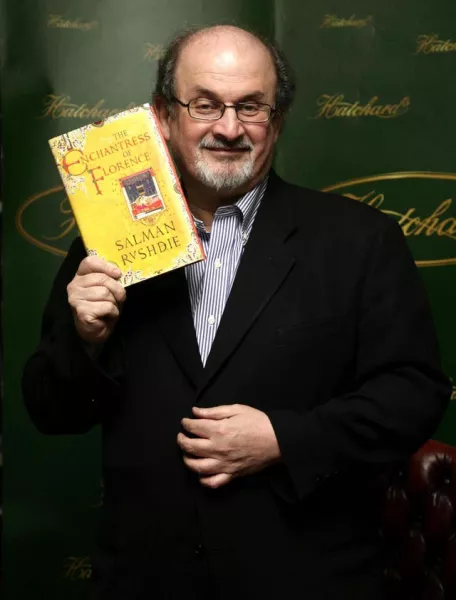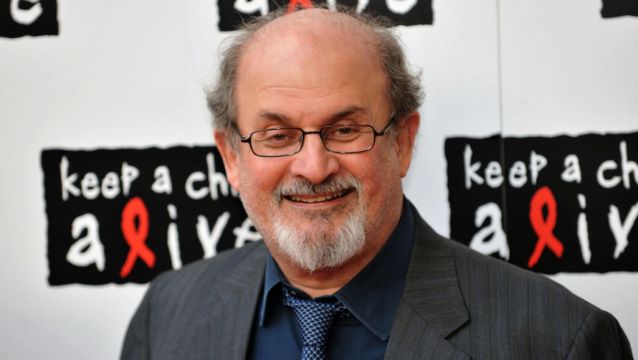Salman Rushdie suffered severe, life-changing injuries but his “usual feisty and defiant sense of humour remains intact”, his family has said.
The author, 75, has a damaged liver and severed nerves in an arm and an eye after he was stabbed at a lecture in New York on Friday.
In a statement, his son Zafar said the family was “relieved” he was taken off a ventilator on Saturday.
He said: “Following the attack on Friday, my father remains in critical condition in hospital receiving extensive ongoing medical treatment.
“We are extremely relieved that yesterday he was taken off the ventilator and additional oxygen and he was able to say a few words.

“Though his life changing injuries are severe, his usual feisty & defiant sense of humour remains intact.
“We are so grateful to all the audience members who bravely leapt to his defence and administered first aid along with the police and doctors who have cared for him and for the outpouring of love and support from around the world.
“We ask for continued patience and privacy as the family come together at his bedside to support and help him through this time.”
In an update on his condition on Sunday, his literary agent, Andrew Wylie, said: “He’s off the ventilator, so the road to recovery has begun.
“It will be long, the injuries are severe, but his condition is headed in the right direction.”
The Indian-born Briton, whose novel The Satanic Verses led to death threats from Iran in the 1980s, was about to deliver a lecture at the Chautauqua Institution, 65 miles from Buffalo in New York state, when he was attacked.
The man accused of stabbing him pleaded not guilty on Saturday to charges of attempted murder and assault, in what a prosecutor called a “pre-planned” crime.
A lawyer for Hadi Matar, 24, entered the plea on his behalf during a formal hearing at a court in western New York.
Matar appeared in court wearing a black and white jumpsuit and a white face mask, with his hands cuffed in front of him.
A judge ordered him to be held without bail after district attorney Jason Schmidt told her Matar took steps to purposely put himself in a position to harm Mr Rushdie, getting an advance pass to the event where the author was speaking and arriving a day early with a fake ID.

“This was a targeted, unprovoked, pre-planned attack on Mr Rushdie,” Mr Schmidt said.
Public defender Nathaniel Barone said the authorities had taken too long to get Matar in front of a judge, while leaving him “hooked up to a bench at the state police barracks”.
“He has that constitutional right of presumed innocence,” Mr Barone added.
Mr Rushdie was stabbed at least once in the neck and once in the abdomen, according to police, before he was taken to hospital.
Mr Rushdie's publisher Penguin Random House said they were “deeply shocked and appalled” by the incident.
UK prime minister Boris Johnson said he was “appalled that Sir Salman Rushdie has been stabbed while exercising a right we should never cease to defend”.
He added: “Right now my thoughts are with his loved ones. We are all hoping he is okay.”
UK Labour Party leader Sir Keir Starmer said: “Salman Rushdie has long embodied the struggle for liberty and freedom against those who seek to destroy them.
“This cowardly attack on him yesterday is an attack on those values. The whole Labour Party is praying for his full recovery.”
US national security adviser Jake Sullivan said: “Today, the country and the world witnessed a reprehensible attack against the writer Salman Rushdie. This act of violence is appalling.

“All of us in the Biden-Harris administration are praying for his speedy recovery. We are thankful to good citizens and first responders for helping Mr Rushdie so quickly after the attack and to law enforcement for its swift and effective work, which is ongoing.”
The president of the Royal Society of Literature, Bernardine Evaristo, said she was pleased to hear he was off a ventilator, adding: “People are always going to disagree, but we have a right to express an opinion and artistic licence should be a human right.
“So – Yes to argument; no to violence.”
Mr Rushdie began his writing career in the early 1970s with two unsuccessful books before Midnight’s Children, about the birth of India, which won the Booker Prize in 1981.
The author lived in hiding for many years in London under a British government protection programme after the fatwa.
In 1998, the Iranian government withdrew its support for the death sentence and Mr Rushdie gradually returned to public life, even appearing as himself in the 2001 film Bridget Jones’s Diary.
The Index on Censorship, an organisation promoting free expression, said money was raised to boost the reward for Mr Rushdie’s killing as recently as 2016, underscoring that the fatwa still stands.
He was knighted in 2008 and earlier this year was made a member of the Order of the Companions of Honour as part of the Queen’s Birthday Honours.







